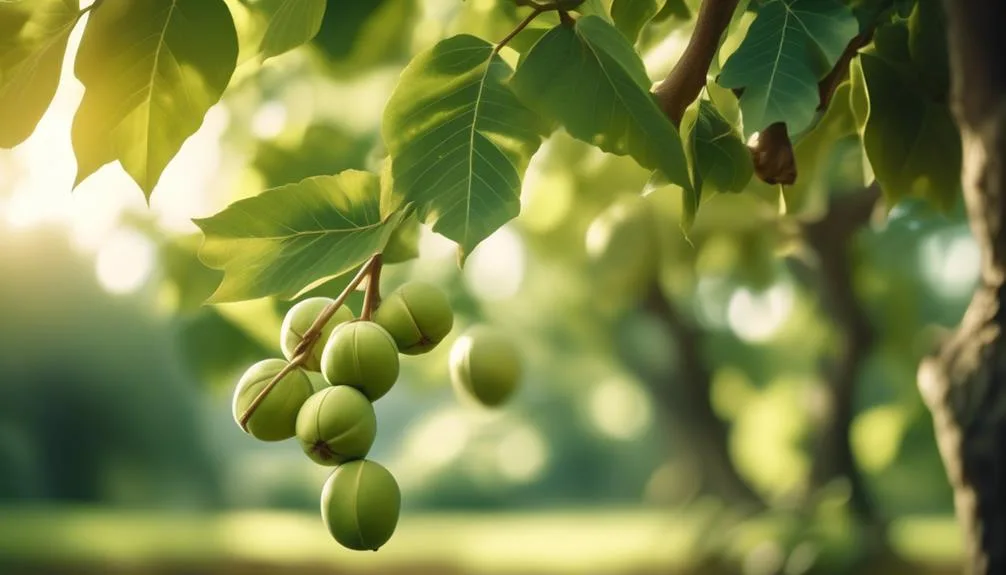For centuries, walnut trees have been used in traditional remedies with a variety of potential health benefits. From ancient cultures to modern applications, the walnut tree has medicinal properties that have caught the attention of researchers.
Let's explore the historical use of walnut trees in traditional remedies, their potential health benefits, and the modern research that sheds light on their effectiveness.
Key Takeaways
- Walnut trees have a long history of use in traditional remedies across different cultures.
- The leaves and bark of walnut trees have been used for various ailments, including skin conditions, digestive issues, and inflammation.
- Walnuts themselves are packed with essential nutrients that contribute to heart health, brain function, and overall well-being.
- Modern research supports the traditional use of walnut trees, as they have been found to have pharmacological effects, including anti-inflammatory and anti-cancer properties.
Historical Use of Walnut Trees in Traditional Remedies
Throughout history, walnut trees have been utilized in traditional remedies for their medicinal properties and health benefits.
The historical significance of walnut trees in traditional medicine dates back centuries, with various cultures incorporating different parts of the tree into their remedies.
In Chinese medicine, walnut leaves have been used to treat skin conditions and inflammation, while the bark has been utilized for its astringent properties.
In European folk medicine, walnut leaves were used to make a tea that was believed to have diuretic and detoxifying effects.
Additionally, the cultural practices of Native American tribes also involved the use of walnut leaves and bark in remedies for a wide range of ailments.
These historical uses of walnut trees in traditional remedies highlight the enduring recognition of their health benefits across diverse cultures.
Medicinal Properties of Walnut Trees
With a rich history of being utilized in traditional remedies across diverse cultures, walnut trees boast a wide array of medicinal properties that have been recognized for centuries. Not only are walnuts a delicious and nutritious snack, but they also offer various healing properties. Packed with essential nutrients such as omega-3 fatty acids, antioxidants, and vitamins, walnuts provide numerous nutritional benefits.
These nutrients contribute to heart health, brain function, and overall well-being. Additionally, the bark and leaves of the walnut tree have been used in traditional medicine to address ailments such as skin conditions, digestive issues, and inflammation.
The healing properties of walnut trees make them a valuable resource for natural remedies, offering a holistic approach to health and wellness.
Traditional Remedies Involving Walnut Trees
In traditional remedies, walnut trees have been utilized for their healing properties, offering natural solutions for various health concerns across different cultures.
Beyond their medicinal uses, walnuts and their trees have also been traditionally valued for culinary purposes. The nuts are used in a variety of dishes, from baked goods to salads, providing a rich, nutty flavor and a dose of healthy fats.
Additionally, the wood from walnut trees is highly prized for its strength and aesthetic appeal, often used in furniture making and woodworking.
However, it's important to consider the environmental impact of utilizing walnut trees for traditional remedies and culinary uses. Sustainable harvesting practices and reforestation efforts are crucial to ensure the longevity of these valuable trees and their ecosystems.
Modern Research on Walnut Tree Remedies
Modern research has uncovered a wealth of scientific evidence supporting the traditional remedies involving walnut trees, shedding light on their potential health benefits and applications. Studies have revealed that walnuts are a rich source of omega-3 fatty acids, antioxidants, and essential nutrients such as vitamin E, magnesium, and folate, making them a valuable addition to a balanced diet.
These nutritional benefits have been linked to improved heart health, brain function, and reduced inflammation. Additionally, research has shown that compounds found in walnut trees may have pharmacological effects, including anti-inflammatory and anti-cancer properties. For instance, certain bioactive components in walnuts have demonstrated potential in combating oxidative stress and inhibiting tumor growth.
These findings highlight the promising role of walnut tree remedies in modern healthcare and wellness practices.
Precautions and Considerations for Using Walnut Trees in Remedies
Considerations for using walnut trees in remedies should include awareness of potential allergic reactions and interactions with certain medications. While walnut remedies have been used traditionally, it's important to note that consuming walnut products may cause allergic reactions in some individuals. Additionally, the high tannin content in walnut leaves and bark may interact with certain medications, affecting their absorption or effectiveness.
It's crucial to consult with a healthcare professional before using walnut remedies, especially if you have known allergies or are taking medications. Furthermore, pregnant or breastfeeding individuals should exercise caution, as there's limited research on the safety of walnut remedies in these cases.
Understanding these considerations and potential side effects is essential for safe and effective use of walnut trees in traditional remedies.
Conclusion
In summary, walnut trees have a long history of being used in traditional remedies for their medicinal properties. Ongoing research is uncovering more about their potential health benefits.
It's essential to use walnut tree remedies with caution due to possible side effects and interactions with medications. Consulting a healthcare professional before incorporating walnut tree remedies is always advisable.
The rich tradition and modern exploration of walnut tree remedies offer a compelling intersection of ancient wisdom and contemporary science, inviting us to consider the intricate relationship between nature and human health.

